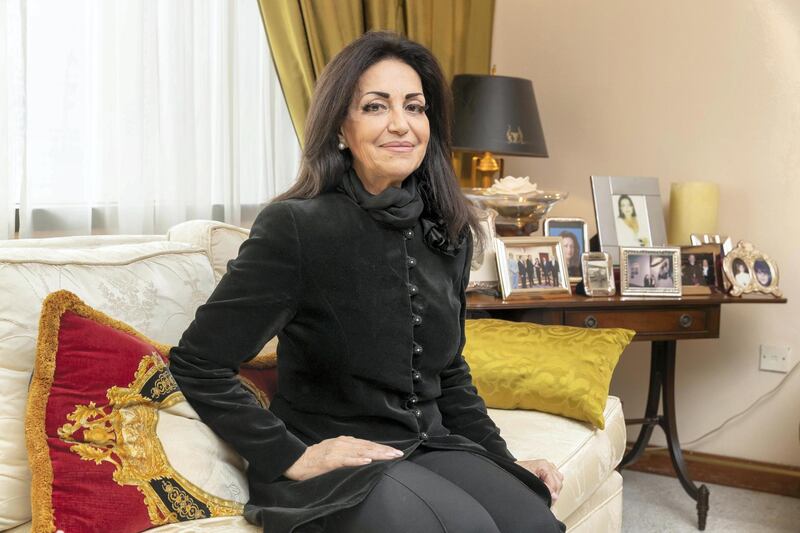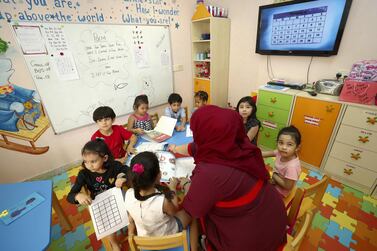Nawal Baz is on a mission to bring hope to prisoners.
She has dedicated herself to helping inmates from her homeland, Lebanon, on the road to rehabilitation and offers respite when it is needed most.
Almost every Wednesday for the past 17 years, she has travelled to Al Wathba Central Prison in Abu Dhabi to act as a "mother and sister" to prisoners coming to terms with life behind bars.
From successfully securing presidential pardons and helping to get debts paid off to simply showing prisoners they are not alone in their time of need, her support has remained steadfast.
She is tireless in her commitment to contacting officials, royals and whoever else necessary to try to reduce a prisoner's sentence.
She admits she was hesitant to embark on her philanthropic path, as she knew once she started her it would dominate her life.
So it has proved – but she wouldn’t change a thing.
“I take the role of the mother and the sister of the prisoner,” she says.
“He is an immigrant here and I do what his mother or sister would have done to ease his situation.”
The entrepreneur-turned-humanitarian has lived in the UAE since 1984.
She describes her role as “psychological rehabilitation for an inmate who is far away from home”.
Her life changed forever in 2002, when Lebanese Consul Fadi Ziadeh asked her to visit a young compatriot serving a life sentence for drugs possession in the UAE.
At first, she was hesitant about making that visit.
"I knew that if I open this door I will get addicted, and will end up putting myself in difficult situations," she said.
But she soon answered her calling.
“The young man called me from prison and said ‘where are you, I’ve been looking forward to seeing you. They told me you will visit me – I am waiting for you’.”
The words resonated with her and she was soon on her way to the prison to offer help.
Ms Baz secured the support of former Lebanese president Emile Lahoud and his wife Andree Lahoud.
Ms Lahoud wrote a letter to Sheikha Fatima bint Mubarak, the Mother of the Nation.
In the letter, seen by The National, Ms Lahoud asked Sheikha Fatima to consider the case of the young man out of tolerance and help him to secure a pardon.
He was pardoned in 2006, after a four-year effort.
Ms Baz does not claim that all those she helps are innocent, but believes it is crucial to try to understand why they carried out their crimes and help to rehabilitate rather than penalise.
“The people I help are not innocent, they are guilty, and they admit that they made a mistake – but I try to ease their situation.
“To be able to stand by someone’s side, we need to understand the reasons that pushed them to make that mistake. It is always out of need.”
Ms Baz has always had a burning desire to help others, dating back to her childhood growing up in conflict-hit Lebanon.
“I believe one is born with that humanitarian passion, you cannot force it. Since I was a child, I had that urge and it often got me into trouble.
“When I was 14 I used my father’s car to take food to people who lost their homes in the Lebanese Civil War.”
She explains that she does not accept cash or gifts from the families of the inmates she helps voluntarily – instead, she asks them to send whatever they want to give her to families of other inmates.
In her home, she proudly displays awards she has received in recognition of her efforts, including honours from Abu Dhabi Police and a prize at from the Arab Woman Awards in 2018.
She said she has had the backing of prison authorities and the government in her endeavours.
"The prison officers are always very co-operative with me because they have seen the results.
“And this is only possible with the support and tolerance of the UAE government who have allowed me access to those prisoners, and given me their co-operation.
“All the help I provide is under the umbrella of the law. We just help the prisoners benefit from leniency factors in the law, especially annual pardoning. We thank the UAE government for that.”
She recalls the story of a young Lebanese woman who was sentenced to three years in jail over a bank loan that she took to pay for her mother's surgery, and then failed to pay back.
“As I was flipping through her case files it also turned out that she had a deportation order against her for forging a certificate to work here as a teacher.
“I cannot acquit or blame her for her circumstances. The mistake has already occurred, out of a certain need.”
Ms Baz convinced the bank to withdraw their lawsuit against the young woman.
“I told the bank there is already a deportation order issued against her, and even if she spends those three years in jail you will not get your money back, so why don’t you withdraw your case?”
The bank was convinced, and the case was lifted.
“Three years later, she called me on Mother’s Day and said she had got married and had children.”








